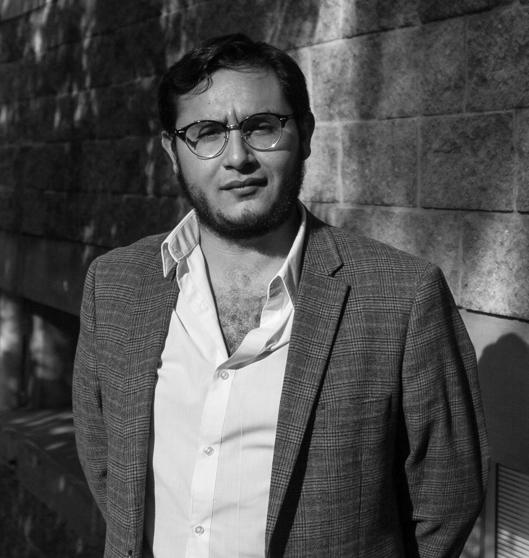Contributors
Elisabeth Baier — Zynismus? Ja, bitte! Embracing cynicism at the International Criminal Court
The paper intends to change the inherently negative focus of debates surrounding cynicism in International Law to a positive-constructive one with regard to the International Criminal Court. This is done in three parts: First, the establishment of the ICC has always been subject to an inherent elevated risk for cynical attacks, as it was started as one of the most idealistic und utopian projects of International Law, creating an immense Fallhöhe. Second, a look at the manifestations of cynicism surrounding the ICC presents an opportunity to identify many of its underlying issues. These will be categorised as dismissive, abusive, discursive and institutional cynicism. Third, cynical backlash should be seen as a chance, as its categorical discriminatory power is able to alert to and unmask existing problems, and accepted as a necessary evolutionary stage the Court has to undergo, embraced as part of its coming of age story. Cynicism has the ability to demystify its targets and the Court might be in desperate need of this demystification. It should use the cynical struggle as a chance to regenerate itself as an institution and return to realistically and clearly defined maxims in the spirit of philosophical cynicism.

Elisabeth Baier graduated from the University of Passau with a degree in law and a specialisation in criminal law in 2014, where she also worked as an assistant for Prof. Robert Esser in the areas of European criminal law, the ECHR and for the research centre “Human Rights in Criminal Proceedings”. She spent her clerkship at the Court of Appeal in Berlin, including a stage at the International Criminal Tribunal for the former Yugoslavia in The Hague, passing the German bar exam in 2016. Before graduating from the London School of Economics with an LL.M. in public international law, supported by a scholarship from the German Academic Exchange Service in 2018, she worked for the chairman of the Committee for Human Rights and Humanitarian Aid of the German Bundestag. After her time as Carlo-Schmid-Fellow at the International Criminal Court, she recently joined the Berlin based criminal law office Danckert, Bärlein, Sättele as a defence counsel.
Jesse Claassen — Assessing the Strategic Use of the EU Preliminary Ruling Procedure by National Courts
In the context of the EU preliminary ruling procedure, national courts display cynical behaviour both by circumvention and by abuse. This contribution examines the ‘strategic use’ of the preliminary ruling procedure by national courts: referring preliminary questions, not because of difficulties of interpretation, but with the aim of obtaining the support of the CJEU to overrule other actors such as (higher) national courts or the national legislature. Although this phenomenon in itself is not new, the contribution focuses on the unaddressed question: is it problematic that national courts use the preliminary ruling procedure for others means than what it is intended for? It is first argued that this behaviour is abusive because the EU judicial system provides more suitable remedies for the aim pursued by this strategy. Consequently, the order of magnitude and variation of this abusive conduct is assessed, based on a comparison between four very different fields of law in which different behaviour is expected: asylum, consumer, criminal and competition law. These fields are analysed on the basis of approximately thirty interviews with Dutch domestic judges, in combination with a case law analysis over the period 2013-2017. Ultimately, the contribution will attempt to provide some explanations for the divergences in abusive behaviour found.

Jesse Claassen is a PhD candidate at the Radboud University Nijmegen, the Netherlands. His PhD research concerns the use of the EU's preliminary ruling procedure by national courts. More specifically, he examines the motives of national courts to refer and not to refer preliminary questions to the Court of Justice of the EU. This research runs parallel to the project of Jasper Krommendijk ‘It takes two to tango. The preliminary reference dance between the Court of Justice of the European Union and national courts’, which is funded by the Netherlands Organisation for Scientific Research (NWO).
Andrea Faraci & Luigi Lonardo — Abuse of Right in International Law: A Roman Law Analogy
The prohibition of abuse of right allows a legal system to bring in ‘moral’ considerations. This article takes a doctrinal-historical approach to discuss aspects of the concept of abuse of right in selected Roman law sources, with the aim of drawing inspiration for a discussion of the theoretical underpinnings of abuse of right in international law.
The first section concerns the development of the Roman legal system. In particular, the evolution of procedural law from the rigid system of legis actiones (‘actions at law’) to the trial per formulas (‘by formulas’) based on the flexibility. The flexible conception of law which was implied in this procedural innovation permitted the development of specific technical tools useful to contrast a ‘cynical’ use of private powers and rights. Such open-endedness of the system could take place through general clauses of equity and good faith.
The second section reflects on the issues arising from the application of general principles, such as good faith and equity, as basis for the prohibition of abuse of right. The article identifies the difficulties of this endeavour and concludes with a reflection on the cynicism of international law: unlike other systems, it is difficult to identify a cogent theoretical underpinning for moral considerations to pervade the legal system. An answer to the conundrum might be the fact that international law is in itself a system of morality.

Andrea Faraci is an Italian qualified lawyer (Avvocato) specialising in civil litigation and labour law. He was teaching and research assistant in Roman Law at the University of Bologna, where he graduated in Law cum laude.

Luigi Lonardo is a Lecturer (Education) in EU Law at the Dickson Poon School of Law, King's College London, where he is completing a PhD, supervised by Professor Takis Tridimas, on the Common Foreign and Security Policy of the European Union. He also teaches at the Paris School of International Affairs of Science Po. Previously, he obtained an LLM in European Law (with distinction) from King's College London, and worked as a trainee lawyer at the law firm Hogan Lovells LLP (Milan Office).
Helene Hayden — (New) Ways of Combating Misuse and Circumvention of European Law on the Example of Tax Evasion
In 2013 the OECD has shown that aggressive tax practices by multinational companies in the form of profit transfers and reductions threaten tax revenues and tax justice and distort competition. For tax subjects, the question of what is assessed as "fair" taxation culminates in the demarcation between permissible tax planning and impermissible abuse. Hence, the presentation examines the limits of misuse of law, its development and its concrete criteria at the European level. The ways of abuse-defence will be analysed divided into its two main manifestations: as a justification firstly of encroachments on fundamental freedoms by a tax burdensome national measure and secondly of refusals of (tax) advantages guaranteed under secondary law. In this context, the two lines of judicature of the ECJ will be explained ("Halifax" and "Cussens") as well as the decision of the European legislator with regard to Art 6 ATAD. Special emphasis will be placed on new ways of combating the abuse of rights, such as a mandatory reporting of certain tax arrangements .

Helene Hayden is a judge in Vienna at the District Court Innere Stadt and is currently assigned to the Austrian Ministry of Justice, Directorate for European and International Affairs. Prior to her judicial education she i.a. worked as an external teacher at the University of Vienna, Department of European, International and Comparative Law and did an internship at the Belgian Embassy and Permanent Mission to the UN. Her research focusses on Commercial and Company Law as well as adjacent European and Tax Law.
Philipp Janig — 'Cynical' Outgrowths of Nationality Planning in Investment Law
In order to leverage the possibilities of the international legal framework to their greatest advantage, multinational corporations have long resorted to nationality planning. Within international investment law, this practice has been generally been considered legal and legitimate. Nevertheless – if understood as a system for the purpose of reciprocal benefits – “nationality planning” potentially creates a notable issue for the legitimacy of the investment law framework, as states are obliged to afford protection to corporations without benefiting from further foreign investments. The purely self-serving character of nationality planning is most prominent where (essentially) domestic disputes are “internationalized” through corporate restructuring.
Arbitral tribunals consider that issue as a jurisdictional issue under the heading of “abuse of rights” and “abuse of process”. That principle in effect allows balancing competing interests of the actors involved. Thus, it appears the appropriate legal tool to redress a “cynical” appeal to international law. This contribution examines more closely arbitral practice in that context. Based thereon, it should determine where tribunals consider the limits of “legitimate” nationality planning to be and how far they themselves have legal tools at their disposal to remedy the consequences of a cynical invocation of international law.

Philipp Janig is Researcher and Lecturer (wissenschaftlicher Mitarbeiter) at the Chair for International Law and International Human Rights Law of the Bundeswehr University Munich. He studied law at the University of Vienna and in Turku, Finland. Prior to working in Munich, he was a Researcher and Lecturer at the University of Vienna, where he currently writes his dissertation on “The General Principles of Abuse of Rights and its Application by International Courts and Tribunals”. In addition, he teaches at the IMC Krems and is the Managing Editor of the Austrian Review of International and European Law (ARIEL) as well as member of the editorial team of the University of Vienna Law Review (VLR).
Konstantin Kleine — The International Law Commission as a Club of Cynics? Originalism and Legalism in the Commission’s Contemporary Work
The paper assesses different dimensions of cynicism in the work of the International Law Commission (ILC), arguing that much of cynicism in the ILC can be attributed to two ideological premises, those of ‘legalism’ and ‘originalism’.
‘Legalism’ describes the ideological belief that law and politics are two fundamentally different and separate things, and politics is inferior to law, while ‘originalism’ is a term borrowed from United States constitutional scholarship, meaning that the US Constitution has to be interpreted based on the original understanding at the time of its drafting. Adapted for the context of the ILC, ‘originalism’ describes a static concept of international law, wherein a treaty, convention, or other document, once concluded, can only be interpreted based on the understanding at the time of its drafting.
It is submitted that together ‘originalism’ and ‘legalism’ have led to several embodiments of cynicism in the ILC. Examples include the widespread denial of the law-making function of the commission, and the insistence on (artificially) separating codification and progressive development in the work of the commission, while regularly discouraging the progressive dimension. Further, the tendency towards reducing international law to what has been established as backed by State consent, and the deliberate reduction of topics of work to uncontroversial issues by excluding anything with a political dimension are analysed.

Konstantin Kleine is a PhD candidate in International Law with a Minor in Anthropology and Sociology at the Graduate Institute of International and Development Studies in Geneva, Switzerland, working on actor-centric genealogies of jus cogens. Since 2015, he is Assistant to Dr. Valencia‐Ospina in the International Law Commission. Previously, he studied law in Germany (Bucerius Law School) and Canada (Dalhousie University), obtained an LL.M. in International Law from the Graduate Institute, and worked as Teaching Assistant on Global Governance at the same institute. His research interests include non‐state normmaking, international legal theory, human rights and humanitarian law, and failing States.
Shiri Krebs — The War on International Law: Legal Cynicism in the Israeli-Palestinian Conflict
On 1 June 2018, Razan Al-Najjar, a twenty-one-year-old Palestinian paramedic, was killed by Israeli fire during demonstrations along the Israel–Gaza border. Her death triggered intense debates concerning the factual circumstances of the shooting and their legal consequences. In response, the Israeli military, as well as several international and domestic organizations, investigated the case, reaching opposing legal conclusions centered on a single question: whether Israeli soldiers committed war crimes. This paper focuses on the role played by international law generally, and international criminal investigations particularly, in a growing new battlefield: the war on public perception of contested wartime events. To provide fresh data and shed new light on the impact of international law on social beliefs about contested wartime events, this paper utilizes a survey experiment fielded in Israel in 2017 with a representative sample of 2,000 Jewish–Israeli citizens. The findings demonstrate that international law labels, such as war crimes, significantly decrease Jewish Israelis’ willingness to believe information about Palestinian casualties and fail to stimulate feelings of empathy toward the victims. Jewish Israelis tend to reject facts described using war crimes terminology, and are more likely to feel anger and resentment than guilt or shame. These findings contribute to the broader debate about the role played by international law during armed conflicts, suggesting that rather than serving as an educational and informative tool, it is perceived as a cynical political tool and a weapon in the war on public opinion.

Shiri Krebs is a Senior Lecturer and HDR Director at Deakin Law School, as well as a Fellow at the Stanford Center for International Security and cooperation (CISAC). Her research focuses on legal fact-finding processes and their impact on social controversies, at the intersection of law, psychology, and political science. To explore these issues, Dr. Krebs utilizes empirical research methods, including survey experiments and interviews. She has taught in a number of top law schools, including at Stanford University and the Hebrew University of Jerusalem, where she won the Dean’s award recognizing exceptional junior faculty members. From 2005 to 2010 Dr. Krebs served as legal advisor to the Chief-Justice of the Israeli Supreme Court. Following this role, she led research projects on national security and human rights at the Israeli Democracy Institute. In 2016 Dr. Krebs was selected by the American Society of International Law for the ‘New Voices’ Panel at the Society’s Annual Meeting. Her scholarship was published in top international law journals, and granted her several awards, including the Lucinda Jordan Research Award (2017), the Franklin Award in International Law (2015), the Goldsmith Award in Dispute Resolution (2012), and the Steven Block Civil Liberties Award (2011). Krebs earned her Doctorate and Master Degrees from Stanford Law School, as well as LL.B., B.A. and M.A., all magna cum laude, from the Hebrew University of Jerusalem.
Gabriel Lentner — Beyond Cynicism and Critique: International Law and the Possibility of Change
Cynics do not have to look far: critical international law has uncovered the ways in which the forces of colonialism and imperialism have been present in the international legal system from its foundation to the present. According to David Kennedy, it is not cynical use of law by despots but experts, including legal scholars, that –subtly but surely – enable, reproduce, legalize and legitimize a world that is ‘terribly unjust, subject to crisis, environmentally unwise, everywhere politically and economically captured by the few, and yet somehow impossible for anyone to alter or escape.’
Against this background I wish to analyze an unintended and overlooked effect of cynical and critical postures in international law scholarship. Specifically, I argue that cynicism about and critique of international law and its workings in scholarship may inadvertently serve to stabilize and legitimize the status quo. I argue that – while important – it is naïve to believe that the sheer gesture of exposing and demystifying power in international law will somehow dissipate its effects. And not only does critique as such not change anything, it may actually contribute to the fatalist construction of our world.
To escape this fatalism, I argue that we need, first, a belief in the possibility of change and, second, an alternative program. Eventually, cynicism about international law must be replaced by knowledge that is ‘potent for constructing worlds less organized by axes of domination’ (Haraway).

Gabriel M. Lentner is Assistant Professor of International Law and Arbitration at Danube University Krems, Austria, a Transatlantic Technology Law Forum Fellow at Stanford Law School and currently (9/2019-6/2020) a Visiting Researcher at Harvard Law School. He holds a PhD in International Law from the University of Vienna School of Law, where he also serves as a Lecturer in Law. Gabriel received a diploma with highest distinction in European Studies from the University of Vienna in 2010 and a diploma in Law & Logic from Harvard Law School and the European University Institute in Florence. Gabriel has published various articles in the field and speaks regularly at international conferences.
Caroline Omari Lichuma — In International Law We (Do Not) Trust: the Persistent Rejection of Economic and Social Rights as a Manifestation of Cynicism
Economic and Social Rights (hereinafter, ESRs) are the unloved and unwanted last born child of the human rights family. Despite a promising start in the Universal Declaration of Human Rights (hereinafter, the UDHR), ESRs still retain a second class status in most national jurisdictions. What explains this cynicism with which ESRs are (still) regarded? This paper analyzes how the skeptical gaze through which ESRs are often viewed legitimizes (or attempts) to legitimize government failures to provide for those members of their populace who are in most desperate need. The paper will proceed in three key parts. Part I aims to demonstrate that most of the common objections to justiciability of ESRs are not insurmountable but rather are a manifestation of the cynicism that plagues certain areas of International Law, Part II will posit that in a number of domestic constitutional settings, a cynical reliance has been made on the supremacy of the (relevant) Constitution(s) in order to forestall the application of international ESRs norms and finally Part III will argue that a certain amount of cynicism is inherent in the history of ESRs and how they advanced through the ages, but also more optimistically that a silver lining exists because contemporary developments point to less rather than more cynicism in the area of ESRs in today’s world.

Caroline Lichuma is a PhD candidate at the Georg-August Universität, Göttingen. She graduated from the University of Nairobi in 2010 with an LLB degree where she received the Hamilton, Harrison and Mathews – Le Pelley Prize for the best third year student in the school of Law for the academic year 2008/2009. She thereafter undertook her LLM degree in International Legal Studies at the New York University School of Law where she was a Dean Graduate scholar. Caroline is also a Certified Public Accountant – Kenya and has worked as an assistant lecturer at the Strathmore Law School and at Riara Law School, both in Nairobi, Kenya. She was the 2014 Emer De Vattel Scholar at The Hague Academy of International Law’s Public International Law Summer School and received a diploma in Justiciability of Economic and Social Rights from the Abo Akademi University in Turku, Finland in 2016. In 2017 she was one of the finalists of the International Junior Faculty Forum held at Stanford Law School, where she presented her paper, “TWAILing the Minimum Core Concept: Rethinking the Minimum Core of Economic and Social Rights.”
Christian R. Pogies — Oceans of Cynicism? Norm-Genesis, Lawfare and the South China Sea Arbitration Case
A prominent assumption about international law is that it fulfils the function of containing and preventing interstate conflicts. Yet, the South China Sea Arbitration (PCA Case Number: 2013-19) has brought the neologism 'lawfare' to prominence in the fields of international relations theory and international law. Relating to the interpretation of the United Nations Convention on the Law of the Sea (UNCLOS), China and the Philippines accused each other of using this concept, which is a combination of law and warfare. I will argue that lawfare and its implications for international law can only be adequately assessed in the present case if both the genesis of UNCLOS and a broader historical perspective are taken into account. UNCLOS was designed to act as the constitution of the oceans but got entangled in a complex environment of customary international law, former peace treaties and the history of colonialism. The Philippines demanded throughout the arbitration proceedings an adherence to the rule of law. However, China denounced the Philippines as proxy of a still present Western hegemony in the international legal system. Furthermore, China explicitly derives the use of international law as a weapon from the experiences of the so-called 'century of humiliation'. The use of lawfare thus positions itself in the field of tension of the desire for international norm compliance by states, structural power relations and the resistance against them.

Christian R. J. Pogies studied history and political science at Christian-Albrechts-University Kiel and Philipps-University Marburg. His B.A. thesis focused on Niklas Luhmann's theory of double-contingency of law as an analytical tool for transitional justice processes. Currently, he is a postgraduate student in International Studies/Peace and Conflict Studies with an emphasis in Globalization and Law at Goethe-University Frankfurt. The working title of his M.A. thesis is 'Konflikt durch Völkerrecht? Die ambivalente Rolle völkerrechtlicher Normgenese im «Krieg der Bücher» um die «Freiheit der Meere»'. In Frankfurt, he works as a student assistant at the Max Planck Institute for European Legal History and recently became a member of the Völkerrechtsblog's editorial team. His interests include the relationship of law to peace and conflict as well as the law of the sea and the formation of knowledge. The overarching research question is: Do we need to develop a conflict theory of international law?
Daniel R. Quiroga-Villamarin — From Speaking Truth to Power to Speaking Power's Truth: Transnational Judicial Activism in an Increasingly Illiberal World
Since the early 90s, fundamental constitutional rights – and, mutatis mutandis, international human rights – have been mobilized to transform structural conditions of injustice before courtrooms all around world. From San José to Karlsruhe, Strasbourg to New Delhi, in both the Global North and South, judges have been at the forefront of the establishment of a new jus gentium common to all humankind. Implicit in this narrative, however, lies the idea that transnational judicial activism has inherent progressive outcomes: the rule of law, human rights, or liberalism tout court are the necessary products of judicial dialogue. This paper will argue that this implicit premise – which responds to the naiveté of the post-cold war period – can no longer hold in an increasingly illiberal world. Thus, it will highlight that judicial activism can also favor illiberal outcomes. Long before liberals and disgruntled socialists turned to judges to protect human rights, courts had been a bulwark of the statu quo. The (in)famous Lochner case before the US Supreme Court bears witness to the fact that Courts not only have the potential to speak truth to power, but also, to speak power's truth.

Daniel R. Quiroga-Villamarin holds a Law degree (with a minor in Government and Public Affairs) from the Universidad de los Andes (Bogotá, Colombia), and is studying the Master in International Law programme at the Graduate Institute of International and Development Studies (Geneva, Switzerland). In the framework of his MA studies, Daniel is currently a graduate exchange student at Melbourne Law School (Melbourne, Australia). After this, he will be a visiting researcher at Harvard Law School’s Institute for Global Law and Policy (IGLP).
His research focuses on international and constitutional law, with a special concern on the theory and history of global governance. His work has been published at the “Anuario de Derecho Constitucional Latinoamericano” (Yearbook of Latin American Constitutional Law), the Journal of the History of International Law, and Global Histories, among other journals.
Theresa Reinold — Cynicism and the Autonomy of International Law
It has become commonplace to assert that power politics permeate international legal discourse and that the international legal system is more prone to being politicized and abused by powerful actors than domestic legal systems. At the same time, however, there are limits to what international law allows powerful actors to do. This contribution therefore seeks to identify the basis of international law’s autonomy from politics. In domestic legal systems, the Luhmannian notion of “normative closure” ensures the autonomy of the law. The concept of normative closure means that the law itself sets the parameters for legal change, and not powerful actors participating in the legal process. International law, by contrast, cannot be considered normatively closed in the same sense because in international law political - even plainly illegal acts - may change the substance of the law. Now, what then prevents international law from becoming an apology for the pursuit of cynical purposes? This contribution proposes to view international law as a coherence-seeking system, and it is precisely this desire for coherence that forms the basis of international law’s autonomy from politics.
Theresa Reinold is Juniorprofessor of Global and Transnational Cooperation Research at Duisburg-Essen University (UDE). Prior to joining UDE, she was Assistant Professor of International Relations at Leiden University. Her research interests lie at the intersection of International Relations Theory, International Law, and Social Psychology. She is particularly interested in the interaction of power and law in global norm-making and implementation, focusing especially on how Western legal concepts travel to non-Western contexts.
Hengameh Saberi — Cynicism in International Law: A Path to Political Entrepreneurship
In an era when challenges to democracy flash international lawyers in the eye, it would be as impulsive to call such challenges unprecedented as it is hard to ignore their great variety and unique characteristics. This essay aims to propose an underexplored outlook, rooted in ancient philosophy, for international law scholarship against the possibility of irrelevance when the global legal order is under siege. This outlook, developed and lived by the ancient Cynics for about eight centuries, promises a reorientation towards political empowerment. The aim is to retrieve the politically invigorating potential of that outlook and discriminate its contribution from the despair and apathy of colloquial or cultural cynicism. In that direction, it explores the journey of cynicism from ancient 'Cynicism' as a mode of living to modern (and less interestingly, postmodern) manifestations of it as a philosophical and political perspective in order to draw out political implications of Cynicism for a more democratic global order. Understood as such, cynicism is neither skeptical (epistemically or otherwise) nor wholly captured by its reputation in unraveling social conventions. It could rather be a bold and fundamental rebuttal to existing social structures precisely because it harbors a deep faith in human capacity for change.

Hengameh Saberi is Associate Professor at Osgoode Hall Law School with interests ranging from international law, international legal theory and history, jurisprudence, to disability law and human rights, epistemology, and Islamic political and legal thought. She has taught in Canada, the United States, Afghanistan and Iran.
Tamas Dezso Ziegler — The Anti-Enlightenment Tradition as a Source of Cynicism in the EU
This chapter tries to analyze the effect of the European Anti-Enlightenment tradition on the EU. It is based on a book of Zeev Sterhell, a foremost Israeli historian (The Anti-Enlightenment Tradition, Yale University Press, 2006). In the book, Sternhell explained the ideological patterns of a European anti-Enlightenment tradition, which dates back to hundreds of years. This tradition contains a disbelief in liberal values, human rights, egalitarianism, rule of law, individualism, tolerance and the peoples` respectful cooperation, and it gets stronger in times of crisis. In the countries where autocratic tendencies occurred recently (like in Hungary and Poland, or partly, in Italy), this tradition started to dominate decision-making. When scholars write about disintegrative tendencies in the EU, it is hard not to notice that present disintegration is a direct result of this tradition. The chapter selects four prime examples (the rule of law backlash, refugee law, Brexit, and the changes on the single market) to show how arguments containing elements of the anti-Enlightenment tradition are used in a cynical way to support partisan, oppressive politics, while maintaining a democratic, seemingly inclusive façade of decision making.

Tamas Dezso Ziegler is an associate professor at the Faculty of Social Sciences of Eötvös Loránd University (Budapest) and a research fellow of the Institute for Legal Studies of the Centre for Social Sciences, Hungarian Academy of Sciences (both in Budapest). His major is EU law (commercial law, justice and home affairs, human rights and commerce), international business law and private international law. He has held numerous visiting positions in several countries like the US, Germany, Switzerland, the UK, Norway and China and participated numerous large-scale research projects like Frame and bEUcitizen funded by the EU. In practice, he has worked for organizations like the OSCE and Baker & McKenzie, among other major law firms. In his recent researches, he started to mix law with European studies and political science to gain a better understanding of political processes and legislative changes within the EU.
